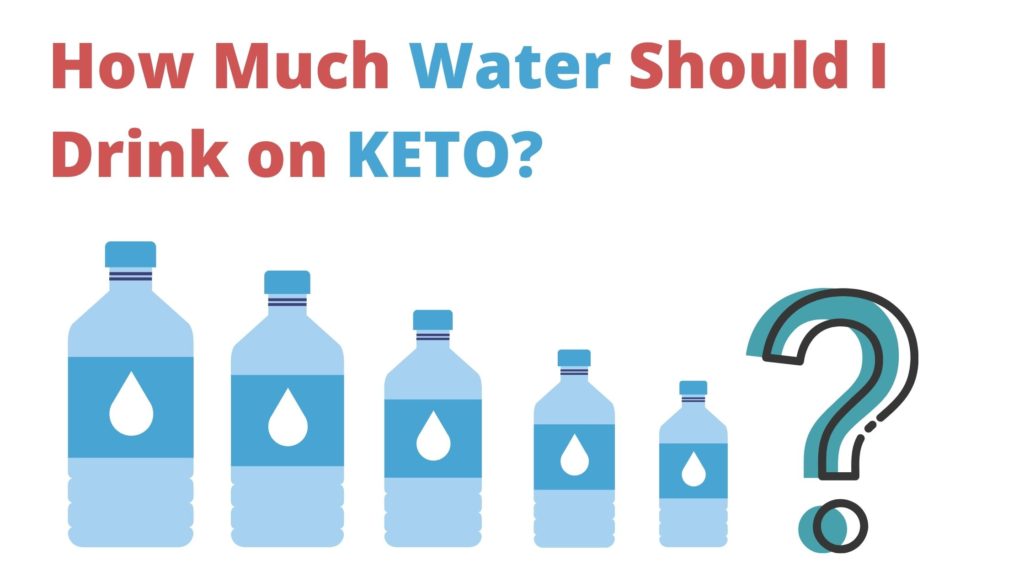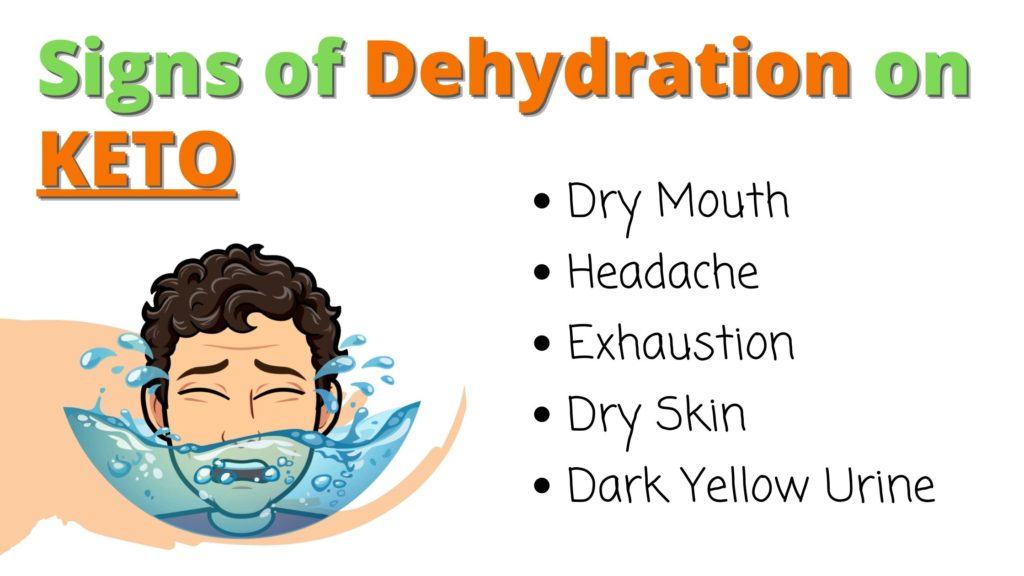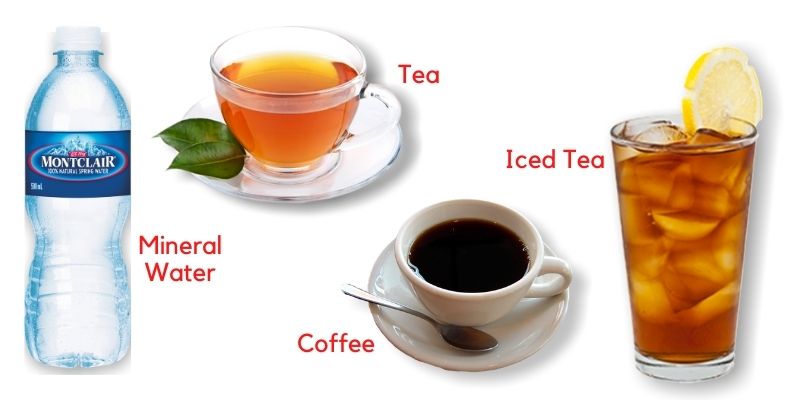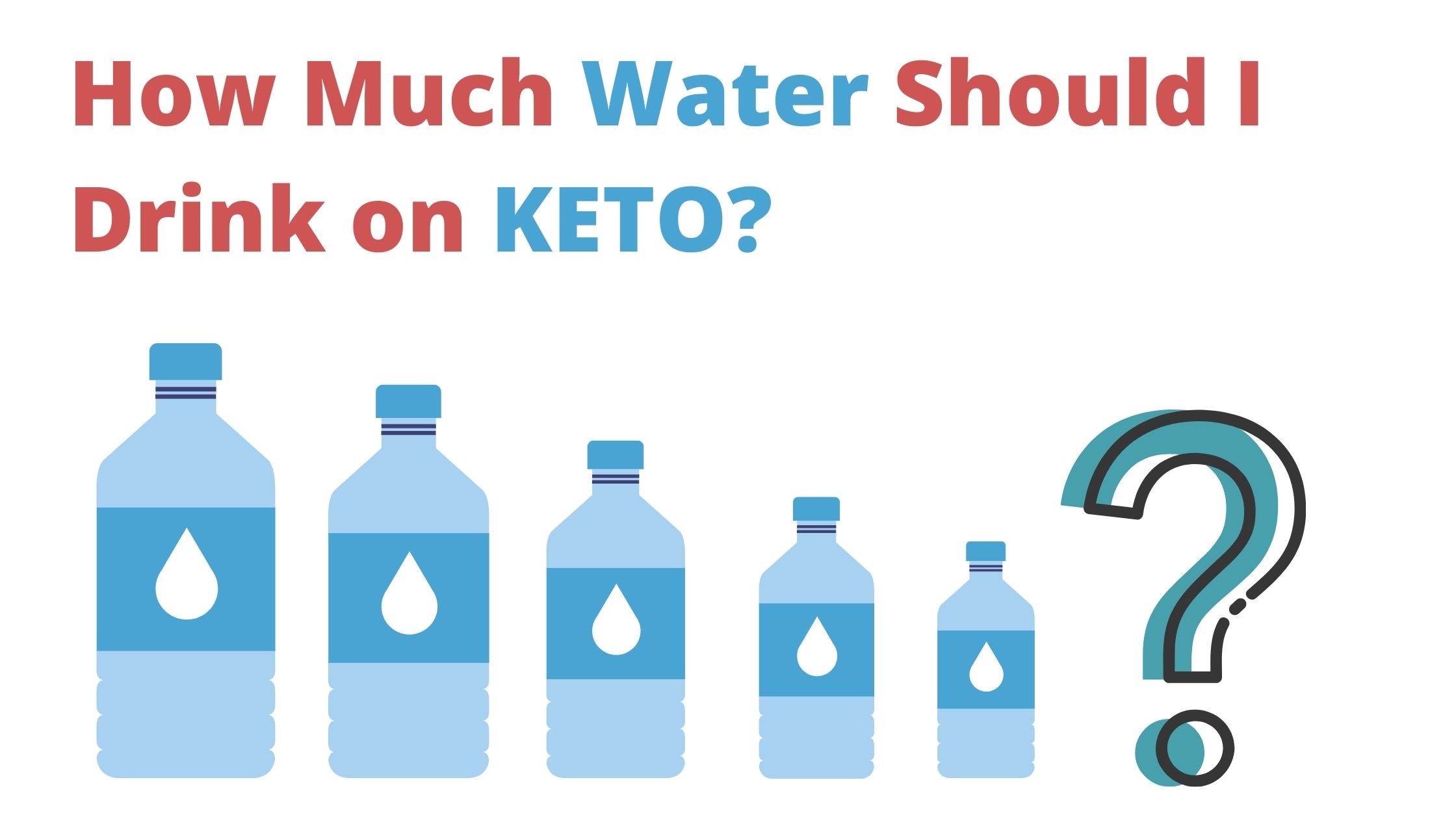How much water should you really drink on a keto diet?
Traditional water intake guidelines go straight to the bin when it comes to keto, because of the changes it makes to your body.
Keep reading for a detailed guide based on my years of experience!

Lifestyle changes such as the high-fat, low carb diet drastically change our water requirements.
When you eat very few carbs, your liver releases glycogen. For every gram of glycogen that is released, two grams of water are excreted in the urine. Hence your chances of dehydration increase tremendously on keto.
Read along to find out the importance of sufficient water intake and why you need more water on this high-fat diet.
How Much Water to Drink on KETO
You need a good keto diet plan (like this one) to enter ketosis, and an even better water routine to reap maximum benefits of keto.
Carbs retain water and sodium within the body. On the ketogenic diet you excrete more salt and water through your body as you minimize your carb intake.
Additionally, keto eliminates various sources of water, like some fruits and vegetables. This lowers your fiber intake and might lead to dehydration.
There’s no hard and fast rule for the exact water intake. But we can suggest you the minimum that will ensure a healthy functioning.
You should aim for 2.5 liters of water per day for proper functioning of your body in ketosis. Once you become keto-adapted, the minimum threshold can be reduced to 2 liters of water per day.
However, additional water needs during the day vary from person to person.
Having a light yellow colored urine is a good sign that you are having ample water. (Some multivitamins containing B vitamins can cause the urine to appear bright yellow, even if you are well hydrated.)

Keep a water bottle with you to sip throughout the day and follow your body’s thirst cues.
How much water to drink on keto can vary from person to person, and if you are feeling signs of dehydration, then you need to up your intake.
Dehydration on Keto
Dehydration is one of the common side effects of a ketogenic diet. Minimizing your carb intake lowers your ability to retain water in the body.
Dehydration on keto can have the following symptoms:
- Dry mouth
- Flu-like symptoms
- Dark yellow/orange urine
- Headaches
- Feeling exhausted
- Rapid heartbeat
- Dizziness
- Dry skin
- Brain fog or mental fatigue

Some of the more dangerous symptoms of dehydration on keto are:
- Not getting the nature’s call
- Constant headache
- Heavy breathing and rapid heartbeat
- Sunken eyes
- Extreme dizziness or fainting
How KETO Affects Your Water Requirements
As you enter ketosis, your body’s cellular mechanisms change significantly.
Ketosis is a process where you shift your energy source from carbs to fats. When you limit your intake of carbs, the body starts utilizing pre-existing glycogen reserves.
For every gram of glycogen stored in the body, two grams of water are stored as well. This is also known as the “water weight”.
As the existing glycogen is released from the cells, the stored water is also excreted out, thus depleting your water levels in the body. This creates an essential need for having sufficient water since you are no longer having a “buffer” stock of water for emergencies.
You are more prone to dehydration during physical activities or excess sweating when your body’s water levels are low.
Most of the symptoms associated with the dreaded keto-flu are due to this phenomenon. Symptoms include weakness, fatigue, irritability, and nausea that can be really annoying right at the beginning phase of keto lifestyle.
That’s why you need to know exactly how much water to drink on keto.
Electrolytes are EQUALLY Important
Water is not the only factor for healthy functioning of your body on keto. Electrolytes such as magnesium, potassium, and sodium, are equally important to regulate fluids throughout the body.
You are already cutting out on salty carbs and processed foods on the keto diet and your sodium consumption is significantly lowered. On top of it, our kidneys tend to excrete more salt and water on the low carb diet.
Low level of electrolytes can cause muscle weakness, cramping, fatigue and prove to be a major hurdle in your keto weight loss journey. (Read our guide on keto exhaustion here.)
These are the recommended daily values for the three essential electrolytes:
| Magnesium | 300–400 mg/d |
| Potassium | Adequate Intake (AI) is 4.7 g/d (4,700 mg/d) and Estimated Minimum Requirement (EMR) is 2,000 mg/d |
| Sodium | 2,400 mg/d (equivalent to 6 g of salt/d) – in the first few weeks of a low carb diet the recommended intake is at 3,000-5,000 mg/d |
Top 7 keto-friendly foods that are rich in electrolytes:
- Nuts: They are a great source of several minerals but they are especially high in potassium and magnesium. Recommended – Almonds, Cashews & Brazil Nuts
- Fish: Fishes are a great source of electrolytes in addition to healthy fats and proteins. Recommended – Mackerel, Salmon & Tuna
- Seeds: Seeds are a powerhouse of micronutrients and essential minerals. Recommended- Hemp seeds, Flax seeds & Chia Seeds
- Vegetables: You can have over the ground, non-starchy veggies on the keto diet. They are a great source of vitamins and electrolytes as well. Recommended: Spinach, Kale, Mushrooms & Artichokes
- Bone broth: It is Abundant in naturally occurring sodium makes it a great choice for ketoers. One serving provides approximately 1100 mg of sodium which is excellent.
- Meats: Other than being a great source of protein, meats also provide essential micronutrients to help combat the keto-flu. Recommended: Turkey, Beef & Pork
- Dairy: You don’t have to completely avoid dairy on a ketogenic diet, contrary to popular belief. Some of the dairy items are packed with essential micro-nutrients and naturally occurring sodium. Recommended: Yogurt, Feta Cheese, Cheddar Cheese & Parmesan
Why Water is SO IMPORTANT During Ketosis
As you hop onto the keto wagon and begin your new weight loss journey, your body goes through major metabolic transitions.
Here’s why having adequate fluid levels is of utmost importance at this stage:
Lower stress on kidneys:
In the early phase of keto, you are producing more ketones than your body needs. The excess ketones need to be flushed out of the body. Drinking sufficient water helps the kidneys to filter out toxic substances while excreting these ketones.
Reduced cravings:
When I first began keto, my cravings were through the roof for the first two weeks. I started having water more frequently and saw a dip in those irresistible cravings. Having your stomach filled with water also curbs appetite which ultimately leads to faster weight loss.
Maintain water level:
Water is essential to sustain human life. It is also used to absorb energy through the food we eat. Carbs help to retain water and sodium into our body. But on a low carb diet, our water levels are reduced to bare minimum. So you need to up your water intake for proper functioning of the body on keto.
Breaking down fats
Breaking down fats for energy (beta oxidation) requires more water than burning carbs. So you need to stay well hydrated to avoid fatigue, headache, dizziness, etc.
Drinks to Keep You Hydrated on Keto
“But water is quite boring…”
You don’t need to be always chugging down glasses of water every hour just to maintain your hydration levels.

Studies show that even caffeinated drinks, when consumed in reasonable amounts are sufficiently hydrating just like water.
Another study found that tea works equally well as a hydrating agent and also enhances mood as a great additional benefit.
This study proved that there is no noticeable difference in hydration among water, tea, coffee, or sparkling water. Fluid intake is all that matters.
Mineral water can be another monotony-breaking addition to your diet which is rich in magnesium and calcium. It is useful for preventing cramps and improves bone health. However, it is a pricey pick and not suited to everyone.
If you are someone like me and can’t stick to just water throughout the day, then sparkling water, mineral water, tea, coffee (limited), and other liquids can come in handy. Just make sure you don’t sack your keto progress by adding sugar into the drinks!
Conclusion
To sum up, if you wonder how much water to drink on keto, then a general answer would be: 2.5 liters of water every day.
However, everyone is different and water requirements vary from person to person. Keep a water bottle near you and sip throughout the day. A light/faded yellow colored urine is a good indicator of sufficient water intake.
These tiny steps can make your Keto journey enjoyable without going through the misery of headaches, cramping, brain fog, fatigue, and muscle soreness.

